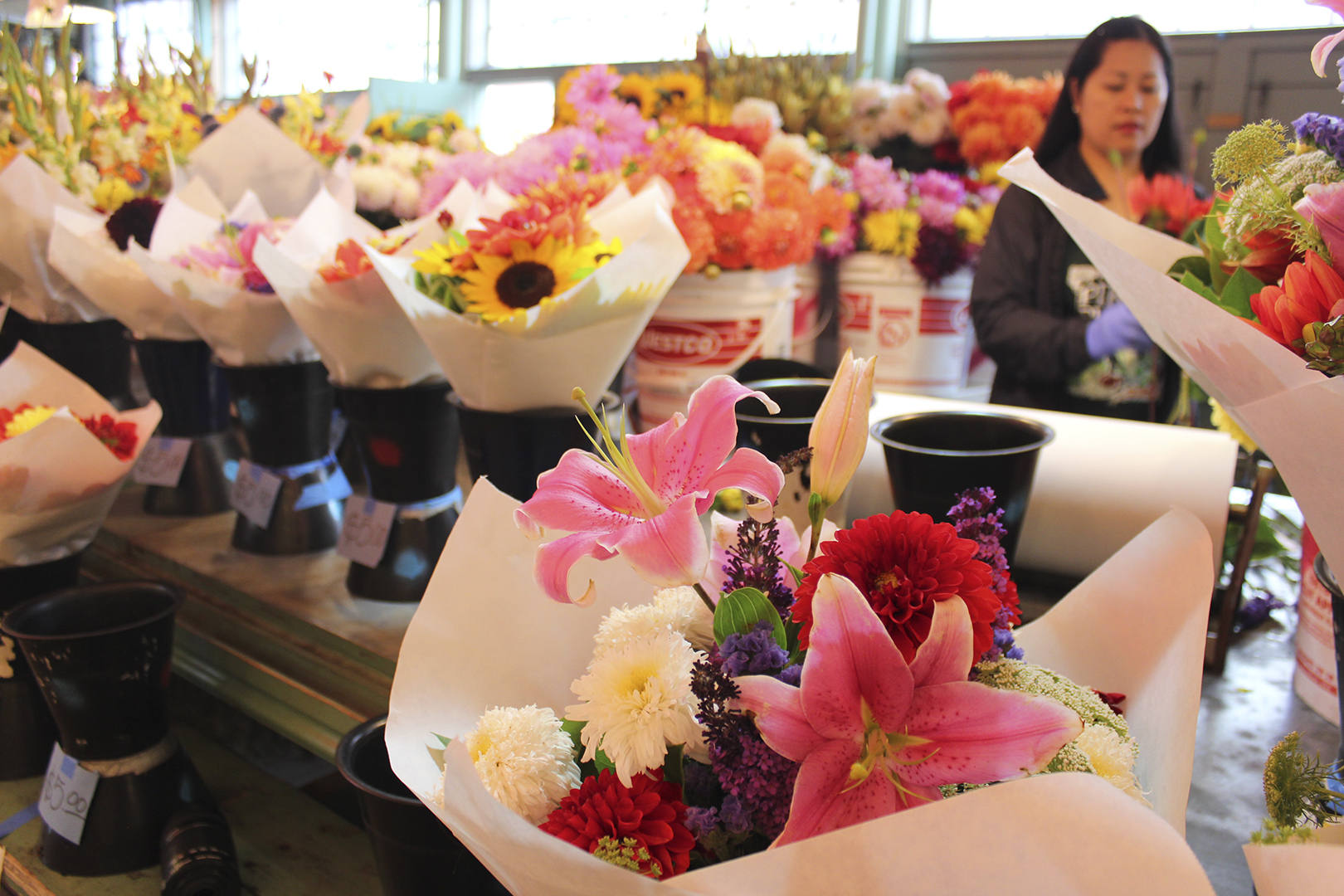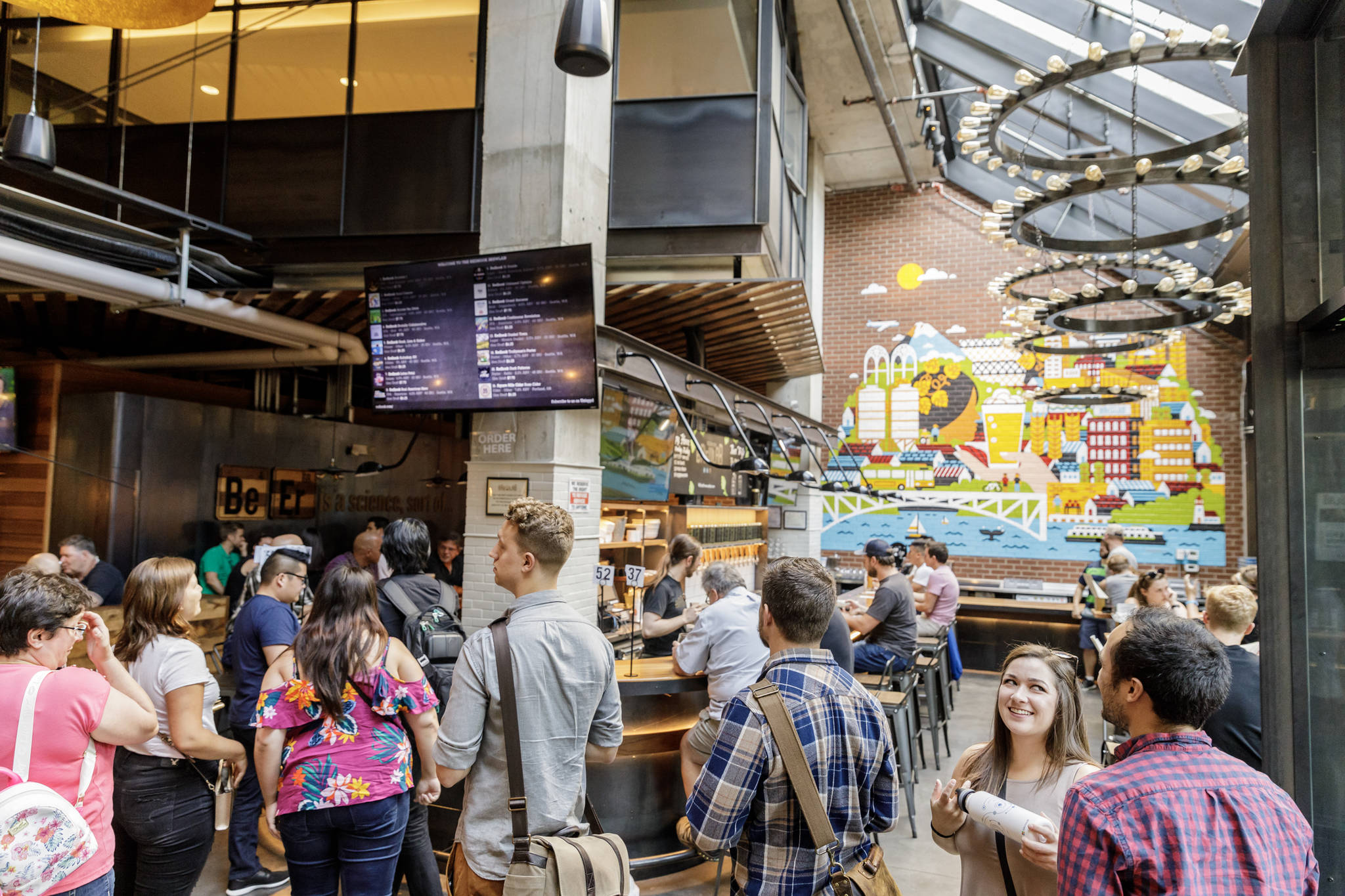Entering Pike Place Market means stepping into an intoxicating cloud of fragrance—not just of smoked salmon and ripe peaches, but of flowers: banks of lavish bouquets that broadcast their beauty in rainbow splashes down the Main Arcade.They’re gorgeous, and they’re cheap. Very cheap.
“I guess it’s just a city-known thing,” says vendor Mary Thao, whose family owns Xai Cha’s Farm, based in Snohomish and selling at Pike Place since 1995. A mixed bouquet of large blooms, crammed with such delights as dahlias or sunflowers or pink tiger lilies, goes for as little as $5. It’s astonishing, really, especially compared to typical florist prices. “If you were a shop, selling [a huge bouquet like] that for $5, you’d be going negative,” she laughs. “Belly up!”
Why so cheap? Competition, for starters. There are multiple flower-sellers at the market, and vendors can’t charge much more without sacrificing sales. But it’s also a volume thing, Thao says. When flowers are in season, her family, anyway, specializes in abundance.
“We are seasonal; we only have so much time to sell,” she says. “$5 bouquets are what keeps your product moving. People love the $5 bouquets.” It’s been that way for as long as she can remember, and, quite frankly, “Some money is better than no money!”
Thao says her family’s story is much like that of the other flower farmers at Pike Place Market: Her parents arrived in Seattle from Laos in the 1970s following the Vietnam War. “They didn’t read or write English or speak well at all,” she says. “The only thing they knew how to do was to garden, or to farm.” In the early 1990s, when Thao’s aunt had a stall at Pike Place, they began selling some of their backyard produce there. But flowers always fared better than vegetables; by 1995, they’d purchased a business license and opened their own flower stall.
These days, while Thao sells flowers, her parents sell tomatoes and berries at other markets around the city. Then, almost every evening, from late afternoon until it’s too dark to see, they cut flowers from the fields they tend in Snohomish and drive a truck full of blooms back to their daughter in Seattle. “They don’t get home until really late,” she says, sometimes not until midnight. “It’s pretty ridiculous. And while I’m at the market, they’re already back at the farm doing the same thing.”
Mary Jane Graham, who arrived in Seattle from the Philippines in 2009 and has been selling flowers for Cha’s Farm (not to be confused with Xai Cha’s) for the past two years, also works long hours: usually from 6 or 7 a.m. until 6 or 7 p.m., seven days a week. But this gig is far better than her previous one, a housekeeper in a downtown Seattle hotel.
Graham confirms the experiences of many hotel housekeepers in the city: It is a “really hard job” with a huge amount of heavy lifting. In fact, the reason she stopped working nights at the hotel and days at the market—besides the fact that working 24/7 is miserable, and she has a small child—is that she injured her back in October.
Since then it’s been all flowers, all the time.
“I love it here,” she says. Though being on her feet 12 hours a day every day of the week is hardly painless, it’s gratifying. Hotel work was grueling. “This is more just having fun.”
Like Thao, Graham explains that the startlingly low price point on her bouquets has everything to do with volume—these are fresh offerings, after all, that hardly ever last more than a day or two. “Better a little bit of money,” she says, “than just wasting the flowers.”
Still, the expectations that the market’s super-cheap flowers have created are, let’s face it, kind of unfair. “People who like the $5 arrangements,” says Thao, will invariably ask, “ ‘Oh, this is $15 dollars? Can I get it for $10?’, you know? I’m sure they’re probably trying to save money. I get it. At the same time, I can’t help but feel a little insulted… Something like that is so expensive at a flower shop!”
Thao is laughing as she says it, but she speaks the truth: “I think in Seattle people are a little bit spoiled by so many flowers for such a small price.”
sbernard@seattleweekly.com
Read about the rest of the Best of Seattle Reader Poll winners here. If you didn’t get a chance to vote this go-round, make sure your voice is heard next year. Email us at bestofseattle@seattleweekly.com and we will let you know when nominations open for BoS 2017.









